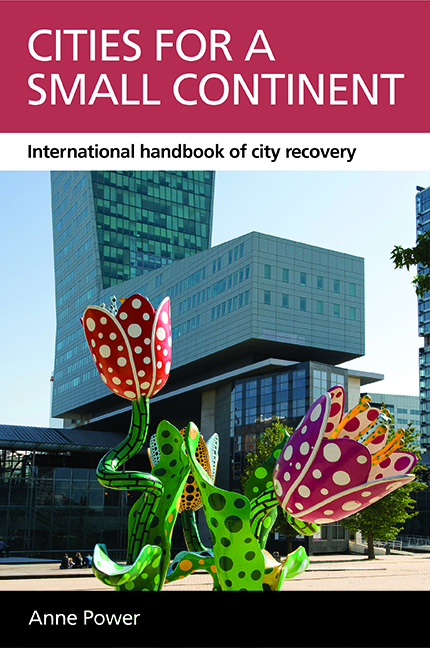Book contents
- Frontmatter
- Contents
- List of tables and figures
- Abbreviations and acronyms
- Acknowledgements
- Copyright material
- Foreword
- one Lessons from cities in a crowded continent Tale of a city – Bilbao
- two Divided and united Europe Tale of a city – Belfast
- three Grit and vision Tale of a city – Sheffield
- four Struggle and strive Tale of a city – Lille
- five Threats and opportunities Tale of a city – St Étienne
- six Over-scale and under-scale Tale of a city – Torino
- seven The power of social innovation Tale of a city – Leipzig
- eight Shoots of growth in older industrial cities in the US Tale of a city – Detroit
- nine Finding new ways out of the woods
- Endnotes
- References
- Afterword
- La Fabrique de la Cité
- Index
five - Threats and opportunities Tale of a city – St Étienne
Published online by Cambridge University Press: 01 September 2022
- Frontmatter
- Contents
- List of tables and figures
- Abbreviations and acronyms
- Acknowledgements
- Copyright material
- Foreword
- one Lessons from cities in a crowded continent Tale of a city – Bilbao
- two Divided and united Europe Tale of a city – Belfast
- three Grit and vision Tale of a city – Sheffield
- four Struggle and strive Tale of a city – Lille
- five Threats and opportunities Tale of a city – St Étienne
- six Over-scale and under-scale Tale of a city – Torino
- seven The power of social innovation Tale of a city – Leipzig
- eight Shoots of growth in older industrial cities in the US Tale of a city – Detroit
- nine Finding new ways out of the woods
- Endnotes
- References
- Afterword
- La Fabrique de la Cité
- Index
Summary
Anyone who believes in indefinite growth in anything physical on a physically finite planet is either mad or an economist.
David Attenborough, quoted in New Statesman, 21 December 2015Box 5.1: Saint-Étienne – a story
Determined efforts to put Saint-Étienne back on Europe's map are working. Even the London underground carries giant tourist advertisements for Saint-Étienne and its new design centre. With an early start, you can arrive at Saint-Étienne’s main station by train all the way from London. You then climb onto the new tram that will carry you into the city centre.
The young press assistant in the Mayor's Office explains why she moved to Saint-Étienne from nearby prosperous Lyon: “The housing is cheaper, more accessible and more people-friendly.” The regeneration officer working in the old, dilapidated inner city neighbourhoods, a born-and-bred returning Stéphanois spends his working hours going door-to-door to uncover people's real needs and encourage residents to stay and enjoy the improvements underway. “We learnt our lessons from the 1960s – wholesale demolition and brutal estate building. We tore up communities. Now we want to hold onto them.”
Out on Saint-Étienne's largest estate, young residents of North African origin are angry. They work in the city-funded youth centre, have ambitions and want to get on, but still feel excluded. They do not ‘buy’ the official French rhetoric that they are equal. There is still a severe lack of jobs for most young people they work and live with. Tensions are everywhere. An old, disused coal-mining shaft within the city is being turned into a mining museum. On its edge is a travellers’ encampment, due to be moved away as the site is restored.
European cities increasingly face such conflicts over city space as now many Roma communities belong within the European Union. Many migrants are crossing the Mediterranean and heading north. No-one is quite sure how Europe will cope.
Introduction: troubling recession
In 2007 when the international banking crisis first broke, Europe’s former industrial cities were in recovery mode. Now the most troubling European recession since the 1930s has hampered recovery and posed many new threats.
- Type
- Chapter
- Information
- Cities for a Small ContinentInternational Handbook of City Recovery, pp. 135 - 176Publisher: Bristol University PressPrint publication year: 2016



